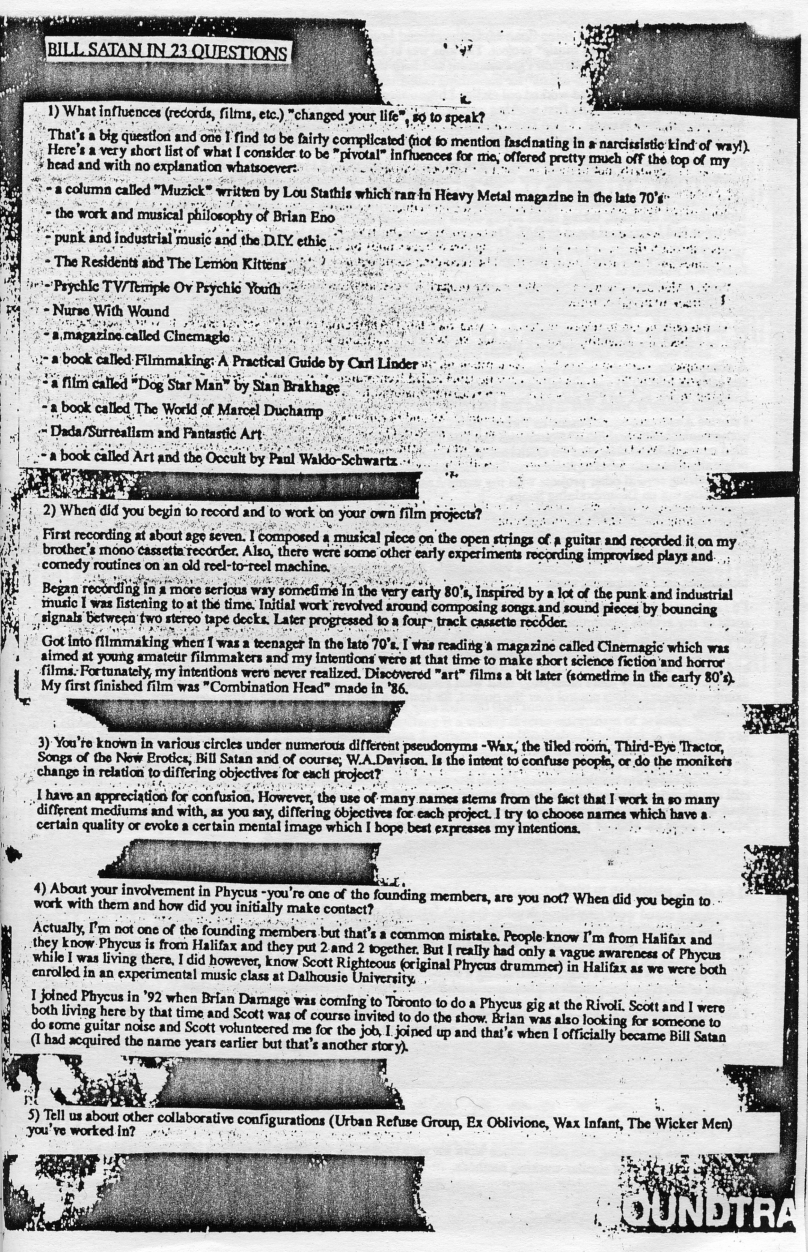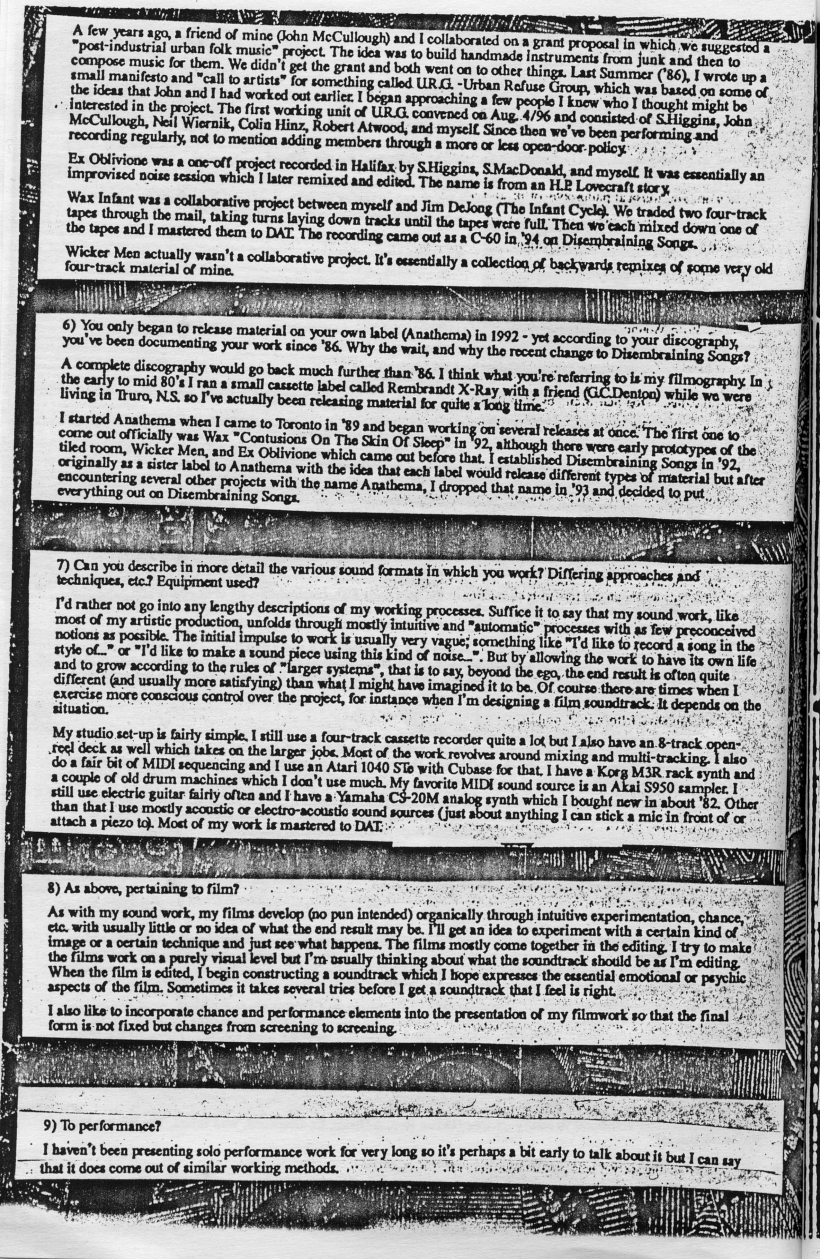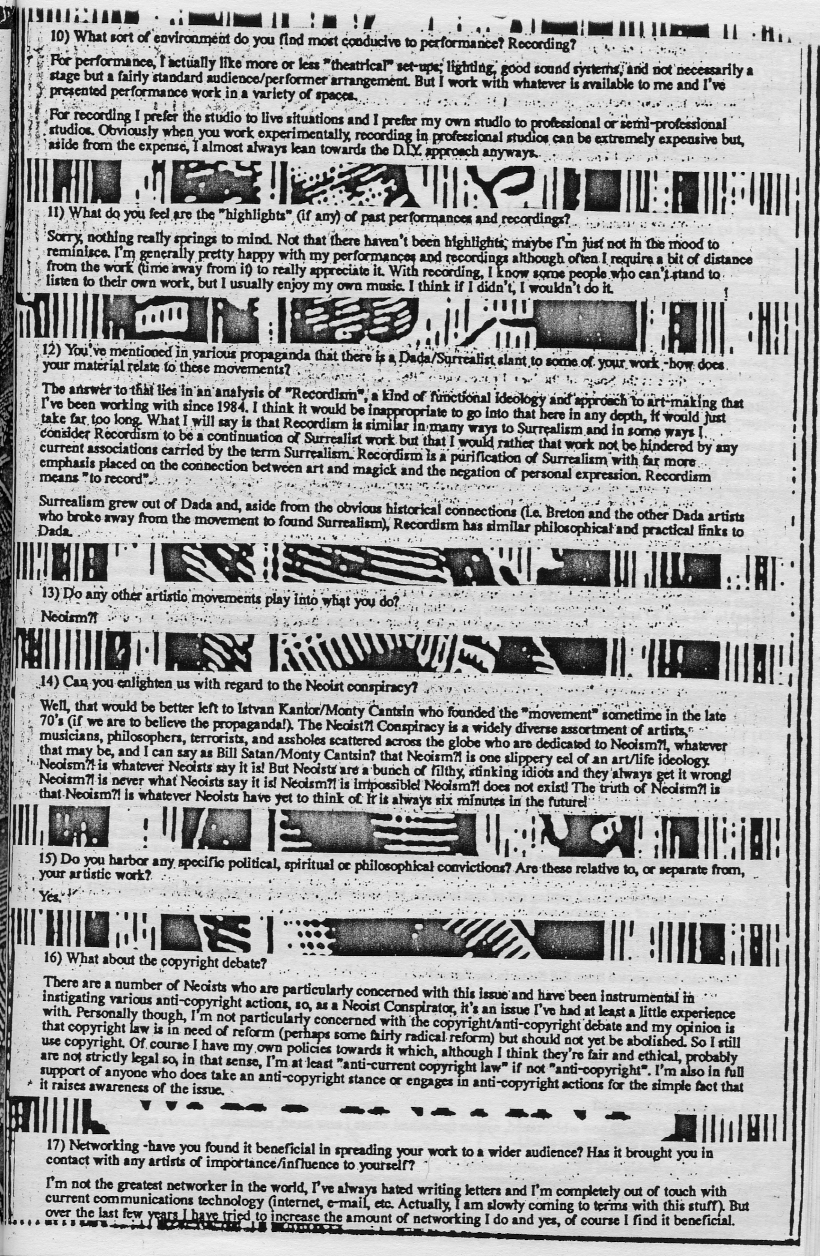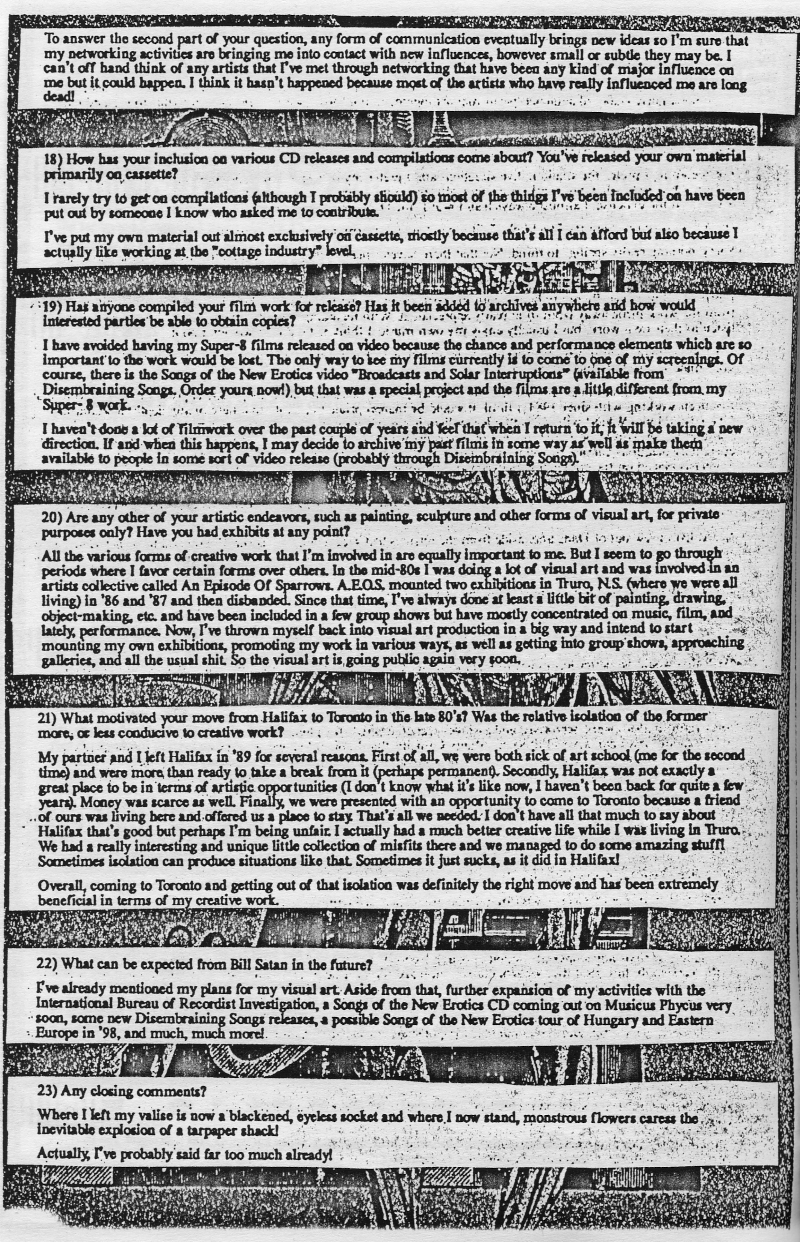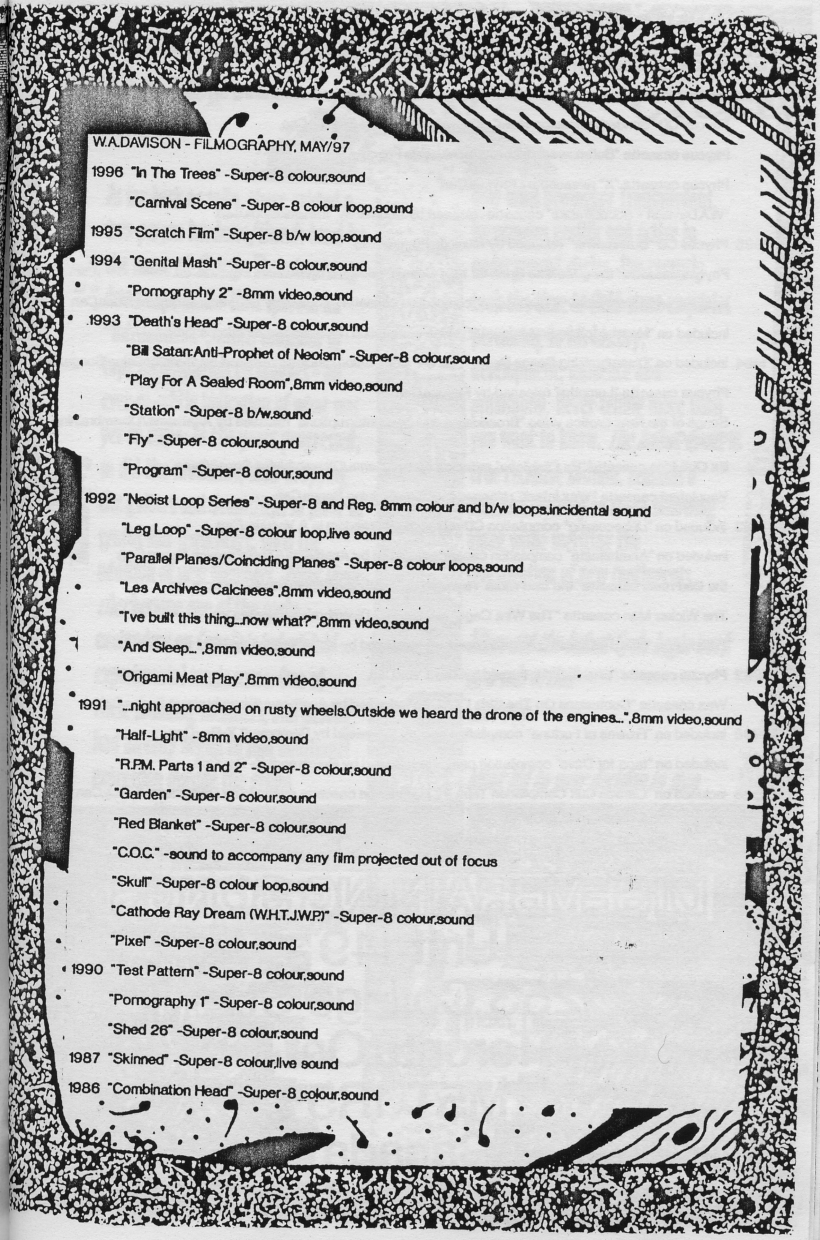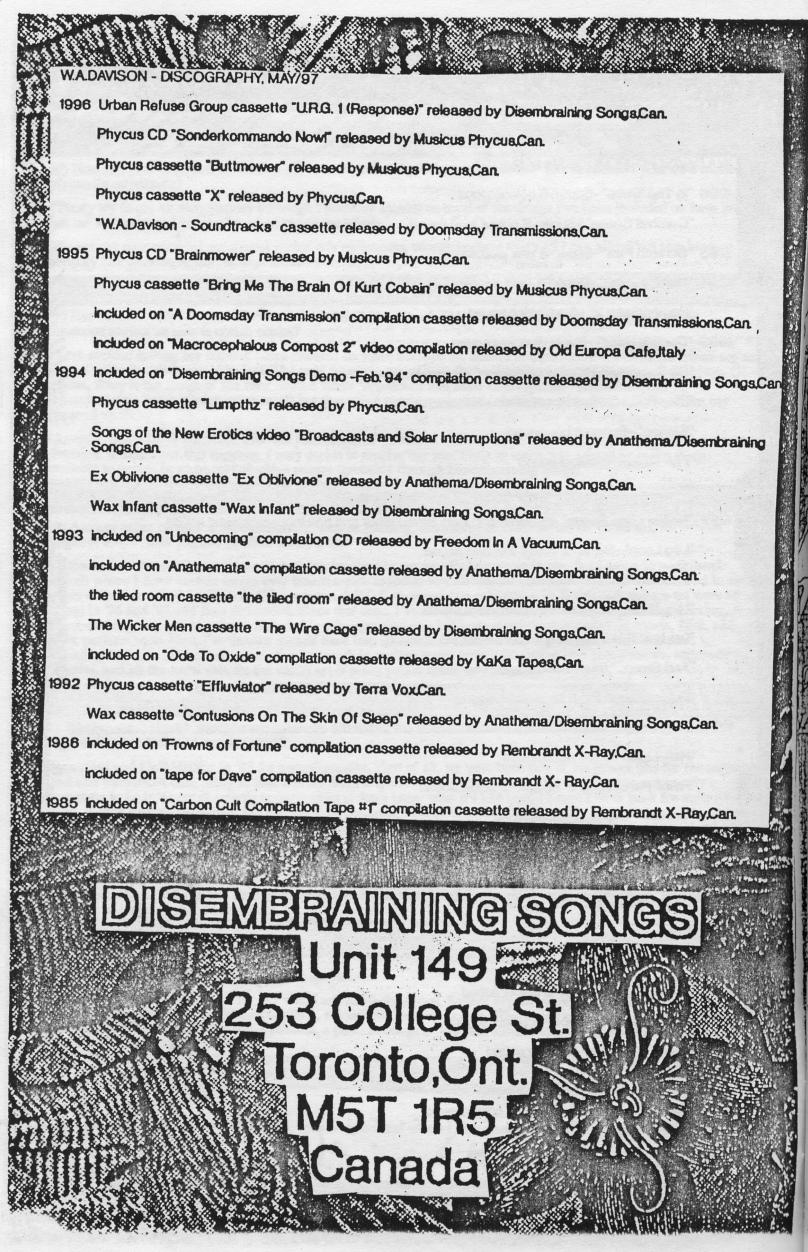Bill Satan In 23 Questions
1) What influences (records, films, etc.) "changed your life", so to speak?
That's a big question and one I find to be fairly complicated (not to mention fascinating in a narcissistic kind of way). Here's a very short list of what I consider to be "pivotal" influences for me, offered pretty much off the top of my head and with no explanation whatsoever:
- a column called "Muzick" written by Lou Stathis which ran in Heavy Metal magazine in the late 70's
- the work and musical philosophy of Brian Eno
- punk and industrial music and the D.I.Y. ethic
- The Residents and The Lemon Kittens
- Psychic TV/Temple OV Psychic Youth
- Nurse With Wound
- a magazine called Cinemagic
- a book called Filmmaking: A Practical Guide by Carl Linder
- a film called "Dog Star Man" by Stan Brakhage
- a book called The World Of Marcel Duchamp
- Dada/Surrealism and Fantastic Art
- a book called Art and the Occult by Paul Waldo-Schwartz
2) When did you begin to record and to work on your own film projects?
First recording at about age seven. I composed a musical piece on the open strings of a guitar and recorded it on my brother's mono cassette recorder. Also, there were some other early experiments recording improvised plays and comedy routines on an old reel-to-reel machine.
Began recording in a more serious way sometime in the very early 80's, inspired by a lot of the punk and industrial music I was listening to at the time. Initial work revolved around composing songs and sound pieces by bouncing signals between two stereo tape decks. Later progressed to a four-track cassette recorder.
Got into filmmaking when I was a teenager in the late 70's. I was reading a magazine called Cinemagic which was aimed at young amateur filmmakers and my intentions were at that time to make short science fiction and horror films. Fortunately, my intentions were never realized. Discovered "art" films a bit later (sometime in the early 80's). My first finished film was "Combination Head" made in '86.
3) You're known in various circles under numerous different pseudonyms - Wax, the tiled room, Third-Eye Tractor, Songs of the New Erotics, Bill Satan, and of course, W.A.Davison. Is the intent to confuse people, or do the monikers change in relation to differing objectives for each project?
I have an appreciation for confusion. However, the use of many names stems from the fact that I work in so many different mediums and with, as you say, differing objectives for each project. I try to choose names which have a certain quality or evoke a certain mental image which I hope best expresses my intentions.
4) About your involvement in Phycus - you're one of the founding members, are you not? When did you begin to work with them and how did you initially make contact?
Actually, I'm not one of the founding members but that's a common mistake. People know I'm from Halifax and they know Phycus is from Halifax and they put 2 and 2 together. But I really had only a vague awareness of Phycus while I was living there. I did, however, know Scott Righteous (original Phycus drummer) in Halifax as we were both enrolled in an experimental music class at Dalhousie University.
I joined Phycus in '92 when Brian Damage was coming to Toronto to do a Phycus gig at the Rivoli. Scott and I were both living here by that time and Scott was of course invited to do the show. Brian was also looking for someone to do some guitar noise and Scott volunteered me for the job. I joined up and that's when I officially became Bill Satan (I had acquired the name years earlier but that's another story).
5) Tell us about other collaborative configurations (Urban Refuse Group, Ex Oblivione, Wax Infant, The Wicker Men) you've worked in?
A few years ago, a friend of mine (John McCullough) and I collaborated on a grant proposal in which we suggested a "post-industrial urban folk music" project. The idea was to build handmade instruments from junk and then to compose music for them. We didn't get the grant and both went on to other things. Last summer ('96), I wrote up a small manifesto and "call to artists" for something called U.R.G. - Urban Refuse Group, which was based on some of the ideas that John and I had worked out earlier. I began approaching a few people I know who I thought might be interested in the project. The first working unit of U.R.G. convened on Aug. 4/96 and consisted of S.Higgins, John McCullough, Neil Wiernik, Colin Hinz, Robert Atwood, and myself. Since then we've been performing and recording regularly, not to mention adding members through a more or less open-door policy.
Ex Oblivione was a one-off project recorded in Halifax by S.Higgins, S.MacDonald, and myself. It was essentially an improvised noise session which I later remixed and edited. The name is from an H.P.Lovecraft story.
Wax Infant was a collaborative project between myself and Jim DeJong (The Infant Cycle). We traded two four-track tapes through the mail, taking turns laying down tracks until the tapes were full. Then we each mixed down one of the tapes and I mastered them to DAT. The recording came out as a C-60 in '94 on Disembraining Songs.
Wicker Men actually wasn't a collaborative project. It's essentially a collection of backwards remixes of some very old four-track material of mine.
6) You only began to release material on your own label (Anathema) in 1992 - yet according to your discography, you've been documenting your work since '86. Why the wait, and why the recent change to Disembraining Songs?
A complete discography would go back much further than '86. I think what you're referring to is my filmography. In the early to mid 80's I ran a small cassette label called Rembrandt X-Ray with a friend (G.C.Denton) while we were living in Truro, N.S. so I've actually been releasing material for quite a long time.
I started Anathema when I came to Toronto in '89 and began working on several releases at once. The first one to come out officially was Wax "Contusions On The Skin Of Sleep" in '92, although there were early prototypes of the tiled room, Wicker Men, and Ex Oblivione which came out before that. I established Disembraining Songs in '92, originally as a sister label to Anathema with the idea that each label would release different types of material but after encountering several other projects with the name Anathema, I dropped that name in '93 and decided to put everything out on Disembraining Songs.
7) Can you describe in more detail the various sound formats in which you work? Differing approaches and techniques, etc.? Equipment used?
I'd rather not go into any lengthy descriptions of my working processes. Suffice it to say that my sound work, like most of my artistic production, unfolds through mostly intuitive and "automatic" processes with as few preconceived notions as possible. The initial impulse to work is usually very vague, something like "I'd like to record a song in the style of..." or "I'd like to make a sound piece using this kind of noise...". But by allowing the work to have its own life and to grow according to the rules of "larger systems", that is to say, beyond the ego, the end result is often quite different (and usually more satisfying) than what I might have imagined it to be. Of course there are times when I exercise more conscious control over the project, for instance when I'm designing a film soundtrack. It depends on the situation.
My studio set-up is fairly simple. I still use a four-track cassette recorder quite a lot but I also have an 8-track open-reel deck as well which takes on the larger jobs. Most of the work revolves around mixing and multi-tracking. I also do a fair bit of MIDI sequencing and I use an Atari 1040 STe with Cubase for that. I have a Korg M3R rack synth and a couple of old drum machines which I don't use much. My favorite MIDI sound source is an Akai S950 sampler. I still use electric guitar fairly often and I have a Yamaha CS-20M analog synth which I bought new in about '82. Other than that I use mostly acoustic or electro-acoustic sound sources (just about anything I can stick a mic in front of or attach a piezo to). Most of my work is mastered to DAT.
8) As above, pertaining to film?
As with my sound work, my films develop (no pun intended) organically through intuitive experimentation, chance, etc. with usually little or no idea of what the end result may be. I'll get an idea to experiment with a certain kind of image or a certain technique and just see what happens. The films mostly come together in the editing. I try to make the films work on a purely visual level but I'm usually thinking about what the soundtrack should be as I'm editing. When the film is edited, I begin constructing a soundtrack which I hope expresses the essential emotional or psychic aspects of the film. Sometimes it takes several tries before I get a soundtrack that I feel is right.
I also like to incorporate chance and performance elements into the presentation of my filmwork so that the final form is not fixed but changes from screening to screening.
9) To performance?
I haven't been presenting solo performance work for very long so it's perhaps a bit early to talk about it but I can say that it does come out of similar working methods.
10) What sort of environment do you find most conducive to performance? Recording?
For performance, I actually like more or less "theatrical" set-ups; lighting, good sound systems, and not necessarily a stage but a fairly standard audience/performer arrangement. But I work with whatever is available to me and I've presented performance work in a variety of spaces.
For recording I prefer the studio to live situations and I prefer my own studio to professional or semi-professional studios. Obviously when you work experimentally, recording in professional studios can be extremely expensive but, aside from expense, I almost always lean towards the D.I.Y. approach anyways.
11) What do you feel are the "highlights" (if any) of past performances and recordings?
Sorry, nothing really springs to mind. Not that there haven't been highlights, maybe I'm just not in the mood to reminisce. I'm generally pretty happy with my performances and recordings although often I require a bit of distance from the work (time away from it) to really appreciate it. With recording, I know some people who can't stand to listen to their own work, but I usually enjoy my own music. I think if I didn't, I wouldn't do it.
12) You've mentioned in various propaganda that there is a Dada/Surrealist slant to some of your work - how does your material relate to these movements?
The answer to that lies in an analysis of "Recordism", a kind of functional ideology and approach to art-making that I've been working with since 1984. I think it would be inappropriate to go into that here in any depth, it would just take far too long. What I will say is that Recordism is simialr in many ways to Surrealism and in some ways I consider Recordism to be a continuation of Surrealist work but that I would rather that work not be hindered by any current associations carried by the term Surrealism. Recordism is a purification of Surrealism with far more emphasis placed on the connection between art and magick and the negation of personal expression. Recordism means "to record".
Surrealism grew out of Dada and, aside from the obvious historical connections (i.e. Breton and the other Dada artists who broke away from the movement to found Surrealism), Recordism has similar philosophical and practical links to Dada.
13) Do any other artistic movements play into what you do?
Neoism?!
14) Can you enlighten us with regard to the Neoist conspiracy?
Well, that would be better left to Istvan Kantor/Monty Cantsin who founded the "movement" sometime in the late 70's (if we are to believe the propaganda!). The Neoist?! Conspiracy is a widely diverse assortment of artists, musicians, philosophers, terrorists, and assholes scattered across the globe who are dedicated to Neoism?!, whatever that may be, and I can say as Bill Satan/Monthy Cantsin? that Neoism?! is one slippery eel of an art/life ideology. Neoism?! is never what Neoists say it is! Neoism?! is impossible! Neoism?! does not exist! The truth of Neoism?! is that Neoism?! is whatever Neoists have yet to think of. It is always six minutes in the future!
15) Do you harbor any specific political, spiritual or philosophical convictions? Are these relative to, or separate from your artistic work?
Yes.
16) What about the copyright debate?
There are a number of Neoists who are particularly concerned with this issue and have been instrumental in instigating various anti-copyright actions, so, as a Neoist Conspirator, it's an issue I've had at least a little experience with. Personally though, I'm not particularly concerned with the copyright/anti-copyright debate and my opinion is that copyright law is in need of reform (perhaps some fairly radical reform) but should not yet be abolished. So I still use copyright. Of course I have my own policies towards it which, although I think they're fair and ethical, probably are not strictly legal so, in that sense, I'm at least "anti-current copyright law" if not "anti-copyright". I'm also in full support of anyone who does take an anti-copyright stance or engages in anti-copyright actions for the simple fact that it raises awareness of the issue.
17) Networking - have you found it beneficial in spreading your work to a wider audience? Has it brought you in contact with any artists of importance/influence to yourself?
I'm not the greatest networker in the world, I've always hated writing letters and I'm completely out of touch with current communications technology (internet, email, etc. Actually, I am slowly coming to terms with this stuff). But over the last few years I have tried to increase the amount of networking I do and yes, of course I find it beneficial.
To answer the second part of your question, any form of communication eventually brings new ideas so I'm sure that my networking activities are bringing me into contact with new influences, however small or subtle they may be. I can't off hand think of any artists that I've met through networking that have been any kind of major influence on me but it could happen. I think it hasn't happened because most of the artists who have really influenced me are long dead!
18) How has your inclusion on various CD releases and compilations come about? You've released your own material primarily on cassette?
I rarely try to get on compilations (although I probably should) so most of the things I've been included on have been put out by someone I know who asked me to contribute.
I've put my own material out almost exclusively on cassette, mostly because that's all I can afford but also because I actually like working at the "cottage industry" level.
19) Has anyone compiled your film work for release? Has it been added to archives anywhere and how would interested parties be able to obtain copies?
I have avoided having my Super-8 films released on video because the chance and performance elements which are so important to the work would be lost. The only way to see my films currently is to come to one of my screenings. Of course, there is the Songs of the New Erotics video "Broadcasts and Solar Interruptions" (available from Disembraining Songs. Order yours now!) but that was a special project and the films are a little different from my Super-8 work.
I haven't done a lot of filmwork over the past couple of years and feel that when I return to it, it will be taking a new direction. If and when this happens, I may decide to archive my past films in some way as well as make them available to people in some sort of video release (probably through Disembraining Songs).
20) Are any other of your artistic endeavors, such as painting, sculpture and other forms of visual art, for private purposes only? Have you had exhibits at any point?
All the various forms of creative work that I'm involved in are equally important to me. But I seem to go through periods where I favor certain forms over others. In the mid-80s I was doing a lot of visual art and was involved in an artists collective called An Episode Of Sparrows. A.E.O.S. mounted two exhibitions in Truro, N.S. (where we were all living) in '86 and '87 and then disbanded. Since that time, I've always done at least a little bit of painting, drawing, object-making, etc. and have been included in a few group shows but have mostly concentrated on music, film, and lately performance. Now, I've thrown myself back into visual art production in a big way and intend to start mounting my own exhibitions, promoting my work in various ways, as well as getting into group shows, approaching galleries, and all the usual shit. So the visual art is going public again very soon.
21) What motivated your move from Halifax to Toronto in the late 80's? Was the relative isolation of the former more, or less conducive to creative work?
My partner and I left Halifax in '89 for several reasons. First of all, we were both sick of art school (for me the second time) and were more than ready to take a break from it (perhaps permanent). Secondly, Halifax was not exactly a great place to be in terms of artistic opportunities (I don't know what it's like now, I haven't been back for quite a few years). Money was scarce as well. Finally, we were presented with an opportunity to come to Toronto because a friend of ours was living here and offered us a place to stay. That's all we needed. I don't have all that much to say about Halifax that's good but perhaps I'm being unfair. I actually had a much better creative life while I was living in Truro. We had a really interesting and unique little collection of misfits there and we managed to do some amazing stuff! Sometimes isolation can produce situations like that. Sometimes it just sucks, as it did in Halifax!
Overall, coming to Toronto and getting out of that isolation was definitely the right move and has been extremely beneficial in terms of my creative work.
22) What can be expected from Bill Satan in the future?
I've already mentioned my plans for my visual art. Aside from that, further expansion of my activities with the International Bureau of Recordist Investigation, a Songs of the New Erotics CD coming out on Musicus Phycus very soon, some new Disembraining Songs releases, a possible Songs of the New Erotics tour of Hungary and Eastern Europe in '98, and much, much more!
23) Any closing comments?
Where I left my valise is now a blackened, eyeless socket and where I now stand, monstrous flowers caress the inevitable explosion of a tarpaper shack!
Actually, I've probably said far too much already!
Brain Scan No. 2, Feb. 98. Editor/interviewer Kevin Paisley
